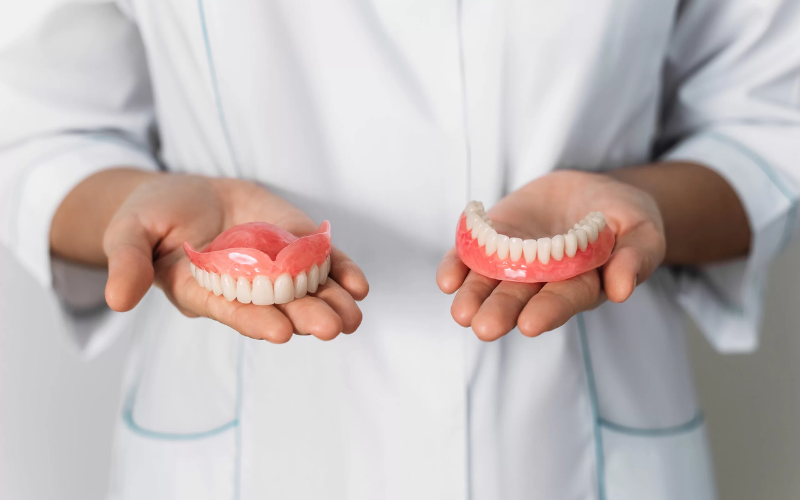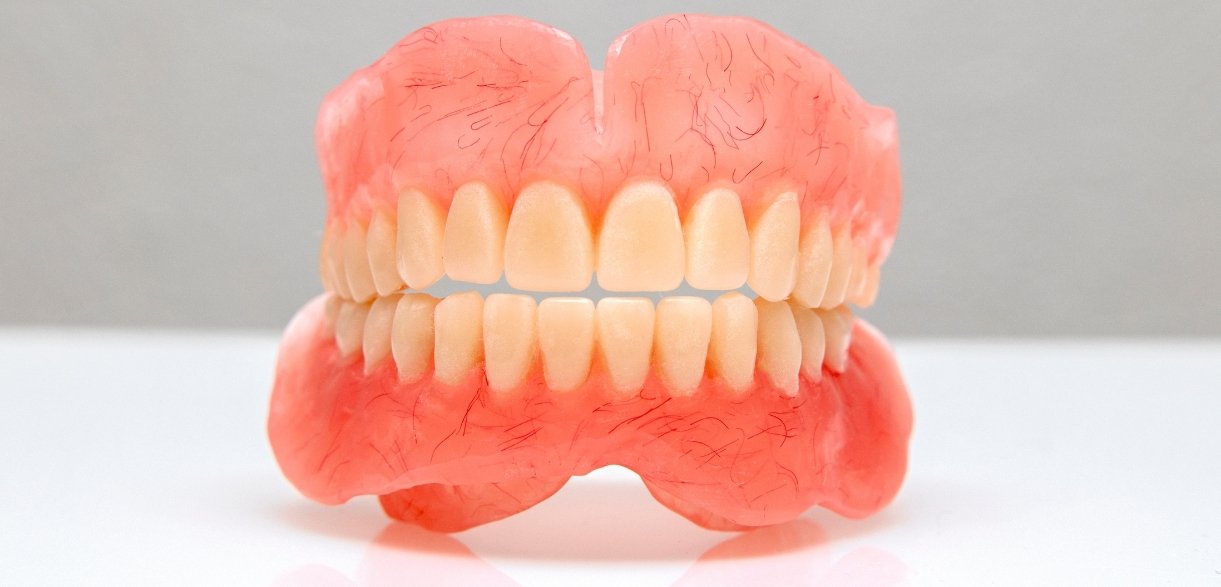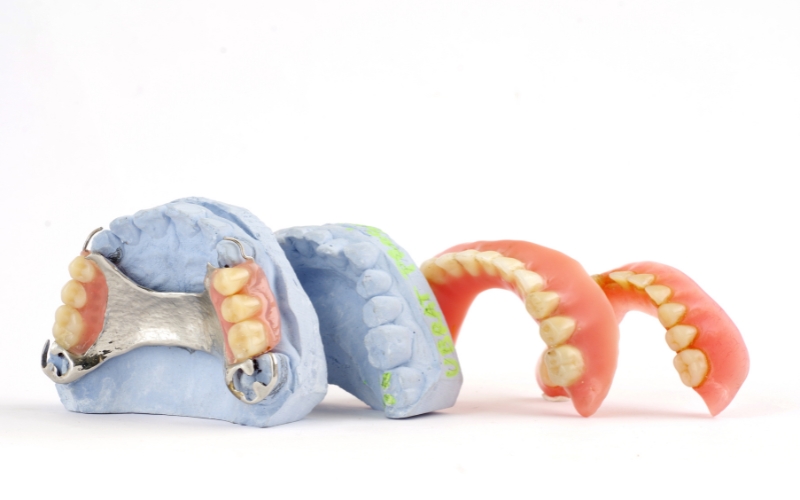1520 Green Oak Place, Suite B Kingwood, Tx 77339
Loose Dentures? Don’t Fret! Our Easy Guide to Snug Them Up

Living with dentures can be a great way to restore your smile and chewing ability after tooth loss. However, over time, dentures can become loose and uncomfortable. This can be frustrating and affect your ability to speak and eat confidently. But before you panic, there are reasons why dentures become loose, and there are solutions!
Why Do Dentures Become Loose?
There are three main reasons why dentures become loose:
- Bone Loss and Shrinking Ridge: After tooth loss, your jawbone naturally begins to shrink because it’s no longer stimulated by tooth roots. This shrinking ridge reduces the support for your dentures, causing them to loosen.
- Improper Denture Fit: Even well-made dentures may not fit perfectly from day one. Slight changes in your mouth shape over time can also contribute to a poor fit.
- Wearing Out of Denture Material: Dentures, like any other dental appliance, experience wear and tear. Over time, the materials can wear down, affecting their fit and stability.
Signs of Loose Dentures
How do you know if your dentures are loose? Here are some telltale signs:
- Difficulty Chewing and Speaking: Loose dentures can move around in your mouth, making it hard to chew food effectively and speak clearly.
- Clicking or Slipping Dentures: Do your dentures click or slip when you talk, laugh, or cough? This is a sign of a loose fit.
- Mouth Soreness and Irritation: Loose dentures can rub against your gums, causing irritation and soreness.
If you’re experiencing any of these signs, don’t wait! Loose dentures can not only affect your comfort but also contribute to further bone loss.
Regaining Snug-Fitting Dentures at Home
While a dentist’s expertise is always recommended for long-term solutions, there are some things you can try at home to improve the fit of your loose dentures in Kentwood. However, it’s important to remember that these are temporary fixes and may not be a permanent solution.
Cleaning Techniques for Improved Fit
Believe it or not, proper cleaning can significantly impact your denture’s fit. Here’s how:
- Brush Twice Daily: Just like your natural teeth, dentures require regular brushing to remove plaque and food particles. Use a soft-bushing denture brush and a non-abrasive denture cleanser. Brushing removes buildup that can prevent a secure fit.
- Soak Overnight: When not in use, dentures should soak in a denture cleanser solution overnight. This keeps them moist and helps maintain their shape, ensuring a better fit when you wear them again. Never use hot water for soaking, as it can warp the dentures.
Pro Tip: For a deeper clean, soak your dentures in a solution of equal parts white vinegar and water for 15-30 minutes once a week. This can help remove stubborn stains and buildup.
Dealing with Built-Up Denture Adhesives
Over time, denture adhesives can form a layer on your dentures, affecting the fit. To address this:
- Clean Thoroughly: Before applying new adhesives, ensure your dentures are completely clean and free of any old adhesive residue. Use a denture brush and cleanser to remove any buildup.
- Apply Sparingly: A little goes a long way! Follow the manufacturer’s instructions for applying the correct amount of adhesive. Too much adhesive can actually make your dentures feel bulkier and less comfortable.
Denture Reliners for a Tighter Fit
Denture reliners are a temporary solution for improving the fit of loose dentures. They are available in two main types:
- Soft Liners: These are pre-formed, cushion-like materials that line the inside of your dentures. They provide a temporary tighter fit and can improve comfort, especially for sore gums.
- DIY Reline Kits: These kits contain materials that allow you to create a custom liner for your dentures at home. Important Note: While convenient, DIY reliners may not be as effective or long-lasting as professional relines done by your Kentwood dentist.
Remember: Denture reliners are a temporary fix. If your dentures continue to loosen after relining, it’s important to see your dentist for a professional evaluation.
When to See a Dentist for Loose Dentures
While DIY fixes can offer temporary relief, there are situations where seeing a dentist near you is crucial for addressing loose dentures.
Limitations of DIY Fixes
DIY reliners and soft liners are temporary solutions. They may wear down over time, requiring frequent replacement. Additionally, they may not address the underlying cause of the loose fit, such as significant bone loss.
Warning Signs That Require Professional Attention
If you experience any of the following alongside loose dentures, schedule a dental appointment immediately:
- Persistent Pain and Irritation: Constant discomfort or sores in your mouth can indicate ill-fitting dentures or underlying oral health problems.
- Damaged Dentures: Cracked, chipped, or broken dentures can irritate your gums and compromise their fit. A dentist can repair or replace damaged dentures.
- Difficulty Removing Dentures: If your dentures become increasingly difficult to remove, it could be a sign of excessive bone loss. A dentist can assess the situation and recommend appropriate solutions.
Professional Solutions for Loose Dentures
Dentists offer a variety of long-term solutions for loose dentures:
- Relining or Rebasing Dentures: A dentist can reline your existing dentures by adding a new layer of material to the inner surface, creating a tighter fit. In some cases, a complete rebase, where the base of the denture is replaced, might be necessary.
- Implant-Supported Dentures: Dental implants are small titanium posts surgically placed in your jawbone. They act as anchors for dentures, providing exceptional stability and preventing slippage.
Choosing the right solution depends on the severity of your bone loss and your individual needs. Your dentist will discuss all the options and recommend the best course of treatment for you.
Preventing Loose Dentures in the First Place
An ounce of prevention is worth a pound of cure! Here are some steps you can take to prevent your dentures from becoming loose in the first place:
Proper Denture Care Routine
- Brushing and Soaking: As mentioned earlier, brushing your dentures twice daily and soaking them overnight in a denture cleanser solution are essential for maintaining their fit and longevity.
- Careful Handling: Always handle your dentures with care. Avoid dropping them or bending them, as this can damage the material and affect the fit.
Here are some additional tips:
- Schedule Regular Dental Checkups: Regular dental checkups allow your dentist to monitor your oral health and the fit of your dentures. Early detection of any problems can help prevent them from worsening.
- Maintain a Healthy Diet: A healthy diet rich in fruits, vegetables, and calcium helps maintain strong bones in your jaw, which provides better support for your dentures.
By following these simple practices, you can significantly reduce the risk of loose dentures and enjoy a confident smile for years to come.
Final Words
Loose dentures can be frustrating, but they don’t have to be a permanent problem. By following the tips in this guide, you can regain a comfortable and secure fit. Remember:
- Practice proper denture care: Brushing, soaking, and handling your dentures with care are essential for maintaining their shape and fit.
- Address any concerns with your dentist: Regular checkups allow for early detection and treatment of loose dentures, preventing further complications.
- Explore solutions: From DIY reliners to professional relining and implant-supported dentures, there are options to achieve a snug fit for your dentures.
With a proactive approach and open communication with your dentist, you can enjoy the confidence and freedom that well-fitting dentures provide. Don’t hesitate to ask your Kentwood dentist any questions you may have about loose dentures or your denture care routine.
Frequently Asked Questions
No, it’s generally not recommended to sleep with denture reliners, especially DIY reliners. These are temporary solutions and may not be as durable as your dentures. Continuous wear can increase the risk of the reliner material deteriorating or breaking. Additionally, saliva production decreases while sleeping, which can affect the adhesive properties of the reliner.
The frequency of relining depends on the type of reliner used and the rate of bone loss in your jaw. Soft liners may need replacing more frequently (every few weeks or months) compared to DIY reliners (lasting a few months). However, dentist-performed relines are generally the most long-lasting solution. Consult your dentist to determine the best relining schedule for your needs.
While generally safe, improper use of denture reliners can pose some risks. Using too much adhesive can cause discomfort and irritation. Poorly fitting DIY reliners can trap food particles and bacteria, potentially leading to gum infections. Always follow the manufacturer’s instructions for use and consult your dentist if you experience any discomfort.







